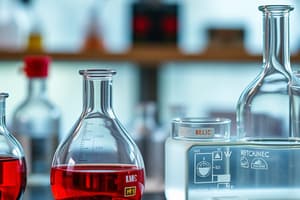Podcast
Questions and Answers
Which type of properties describe pure substances?
Which type of properties describe pure substances?
- Physical properties (correct)
- Intensive properties
- Extensive properties
- Chemical properties
Which property is dependent on the amount present in the substance?
Which property is dependent on the amount present in the substance?
- Extensive property (correct)
- Intensive property
- Chemical property
- Physical property
What is a characteristic of matter that can be observed or measured without changing the composition of the sample?
What is a characteristic of matter that can be observed or measured without changing the composition of the sample?
- Physical property (correct)
- Extensive property
- Intensive property
- Chemical change
What does the law of conservation of mass state?
What does the law of conservation of mass state?
Which process involves one or more substances changing into new ones?
Which process involves one or more substances changing into new ones?
What type of property is density considered as?
What type of property is density considered as?
What is the role of an independent variable in an experiment?
What is the role of an independent variable in an experiment?
Which state of matter flows, has a constant volume, and takes the shape of the container?
Which state of matter flows, has a constant volume, and takes the shape of the container?
What is a scientific law in the context of experiments?
What is a scientific law in the context of experiments?
In what state of matter does the substance fill the entire volume of the container and takes its shape?
In what state of matter does the substance fill the entire volume of the container and takes its shape?
What is the primary purpose of pure research?
What is the primary purpose of pure research?
What is a constant in an experiment?
What is a constant in an experiment?
Study Notes
Experiment and Research
- An experiment is a set of controlled observations that test a hypothesis.
- A variable is a quantity or condition that has more than one value.
- Independent variable is the plan you plan to change during the experiment.
- Dependent variable is the variable that changes in response to a change in the independent variable.
- Scientific law is a relationship in nature that is supported by many experiments.
- Pure research is conducted to gain knowledge for the sake of knowledge itself.
- Applied research is undertaken to solve a specific problem.
Experiment Components
- A control is a standard for comparison.
- A constant is a variable that is not allowed to change during the experiment.
- A conclusion is a judgment based on the information obtained.
- A theory is an explanation of a natural phenomenon based on many observations and investigations over time.
Properties and States of Matter
- Matter can be found in the solid, liquid, gaseous, or plasma state.
- A solid is a form of matter that has its own definite shape and volume.
- A liquid is a form of matter that flows, has constant volume, and takes the shape of the container.
- A gas is a form of matter that not only takes the shape of the container but also fills the entire volume of the container.
- Plasma is another state of matter that is present in places with very high temperatures.
- Vapor is a gaseous state of a substance that is solid or liquid in room temperature.
Physical Properties
- A physical property is a characteristic of matter that can be observed or measured without changing the composition of the sample.
- Physical properties usually describe pure substances.
- Physical properties are of two types: Extensive and intensive properties.
- Extensive properties are dependent on the amount present in the substance like mass.
- Intensive properties are independent on the amount present in the substance like density.
Chemical Properties
- A chemical property is the ability or inability of a substance to combine with or change into one or more other substances.
- A physical change is a change that changes the substance without changing its composition.
- A chemical change is a process that involves one or more substances changing into new ones.
- Evidence of chemical reactions includes changes in color, taste, elimination of gas, or a precipitate.
Law of Conservation of Mass
- The law of conservation of mass states that mass is neither created nor destroyed during a chemical reaction.
- Mass of reactants = mass of products
Studying That Suits You
Use AI to generate personalized quizzes and flashcards to suit your learning preferences.
Description
Test your understanding of experimental variables, scientific laws, and pure research with this quiz. Explore the concepts of independent and dependent variables, as well as the importance of controlled observations in experiments.




